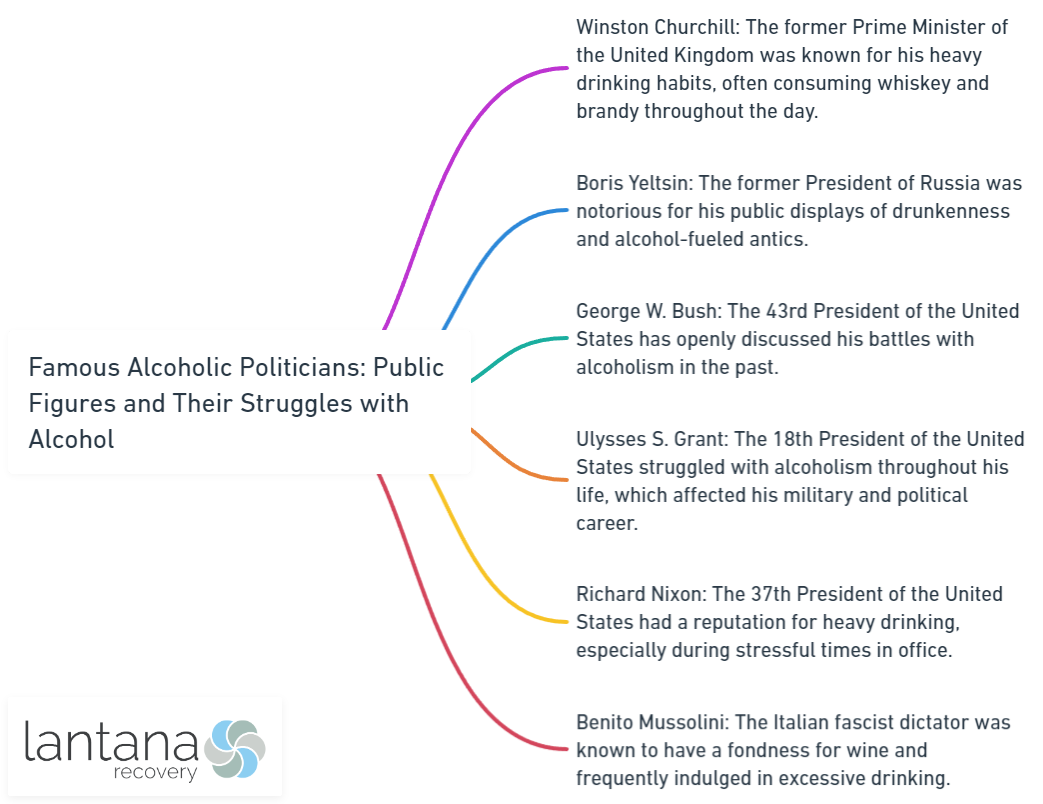Famous alcoholic politicians have long been a topic of public interest and scrutiny. This article delves into the struggles with alcohol faced by prominent public figures and aims to shed light on the impact of alcoholism on their political careers. By understanding alcoholism and its signs and symptoms, we can gain insight into the challenges faced by these politicians throughout history.
Theodore Roosevelt, Winston Churchill, Abraham Lincoln, and Richard Nixon are among the notable examples of politicians who battled alcohol addiction. Despite their achievements, their struggles with alcohol affected their personal lives and political careers.
Alcoholism can have significant consequences on the public perception and stigma surrounding politicians, as well as their political effectiveness and decision-making abilities. It is crucial to recognize the challenges faced by alcoholic politicians and the impact it has on governance.
However, there is hope for recovery. Seeking help and overcoming alcoholism is possible, and many politicians have successfully undergone treatment and achieved long-term sobriety. This article explores the various treatment options available for politicians and shares success stories of those who have conquered their alcohol addiction. By addressing these issues, we can gain a better understanding of the complex relationship between alcoholism and politics, and work towards creating a healthier and more supportive environment for public figures facing these challenges.
Famous Alcoholic Politicians
There have been famous alcoholic politicians in history. These politicians struggled with alcohol addiction. Here are notable examples:
- Winston Churchill: The British Prime Minister loved whiskey and champagne. He drank excessively but it did not hinder his leadership during World War II.
- Thomas Jefferson: The third President of the United States had a deep appreciation for wine. However, his fondness for wine sometimes led to excessive drinking.
- Boris Yeltsin: The first President of the Russian Federation often appeared intoxicated in public. His alcohol abuse raised doubts about his ability to lead effectively.
- Richard Nixon: As President, Nixon engaged in heavy drinking. This habit may have influenced some questionable decisions made during his administration.
Alcohol addiction can affect individuals from all walks of life, including politicians. These examples remind us that even those in power are not immune to addiction challenges. If you or someone you know is struggling with alcohol abuse, for example, you’re the wife of an alcoholic, seeking help and support from experts at Lantana Recovery is crucial for recovery and overall well-being.

Understanding Alcoholism
Understanding alcoholism is crucial for individuals and society to acknowledge and tackle the challenges faced by those grappling with this condition. It is essential to note the following key points:
- Alcoholism is a chronic and progressive disease that has both physical and mental impacts on individuals. It is characterized by an inability to control or cease drinking despite the negative consequences.
- The development of alcoholism is influenced by genetic and environmental factors. While a family history of alcoholism can increase the risk, stress and the availability of alcohol can also play a role.
- Alcoholism affects individuals of all ages, genders, and backgrounds; it is not restricted to any specific group. –
- Recognizing the signs of alcoholism involves observing a strong craving for alcohol, continued drinking despite negative outcomes, a tolerance that requires consuming larger amounts of alcohol for the desired effect, and experiencing withdrawal symptoms when attempting to quit.
- Alcoholism can have severe consequences on physical health, relationships, and overall well-being. It can lead to liver damage, mental health disorders, financial difficulties, and legal issues.
Pro-tip: If you suspect alcoholism in yourself or someone else, it is vital to seek professional help. Reach out to a healthcare provider or a support group for guidance and support. Remember that understanding alcoholism is the first step towards recovery and a healthier life.
What is Alcoholism?
Alcoholism, also known as alcohol use disorder, is a chronic and compulsive condition characterized by excessive consumption of alcohol. This disorder adversely affects the brain, leading to a lack of control over alcohol intake and detrimental effects on both physical and mental health. Individuals with alcoholism often experience intense cravings, struggle with managing their drinking behavior, and persist in consuming alcohol despite the negative consequences it has on relationships, work, and overall well-being. It is crucial to acknowledge that alcoholism is not solely a result of willpower or self-control.
The impact of alcoholism extends beyond the individual and affects their loved ones and society as a whole. It can contribute to various health issues such as liver damage, cardiovascular disease, and neurological disorders. Furthermore, it can also exacerbate mental health conditions like depression and anxiety.
Various treatment approaches exist for alcoholism, including detoxification, medication, therapy, and participation in support groups. Seeking professional help and support is essential for individuals with alcoholism to achieve long-term recovery.
To provide appropriate support and intervention, it is crucial to understand the nature of alcoholism and be able to identify its signs and symptoms. By raising awareness, promoting education, and implementing preventive efforts, we have the potential to decrease the prevalence and minimize the negative impact of this disease on society.
Signs and Symptoms of Alcoholism
The signs and symptoms of alcoholism can vary, but there are common indicators to look out for:
- Increased tolerance: People experiencing alcoholism may require consuming more alcohol to achieve the same effect.
- Withdrawal symptoms: Attempting to reduce alcohol consumption may result in symptoms such as nausea, sweating, shakiness, and anxiety.
- Lack of control: Individuals struggling with alcoholism find it challenging to limit their drinking and face difficulty when trying to stop once they start.
- Neglecting responsibilities: Alcoholism can lead to individuals neglecting work, school, or other obligations in favor of drinking.
- Continued use despite negative consequences: People with alcoholism may continue to drink even when faced with strained relationships or legal issues.
- Drinking to cope with emotions: Many individuals with alcoholism use alcohol as a way to cope with stress, anxiety, or uncomfortable emotions.
- Isolation and secrecy: People with alcoholism may isolate themselves from friends and family and become secretive about their drinking habits.
It’s important to note that exhibiting some of these signs or symptoms does not automatically mean someone is an alcoholic. However, if these behaviors negatively impact their life, seeking professional help or support from Lantana Recovery may be beneficial.

Alcoholic Politicians Throughout History
Throughout history, the world has witnessed a fascinating array of alcoholic politicians who have graced the public stage. From legendary figures like Theodore Roosevelt and Winston Churchill to iconic leaders like Abraham Lincoln and Richard Nixon, these individuals’ struggles with alcohol have left an indelible mark on their legacies. Join us as we delve into the intriguing stories of these prominent political figures, shedding light on the intersection between power, public life, and the personal battles of addiction.
Theodore Roosevelt
Theodore Roosevelt was a prominent politician who greatly influenced American history. He served as the 26th President of the United States from 1901 to 1909 and was known for his progressive policies and conservation efforts. Roosevelt was a charismatic leader who brought significant changes during his time in office. He implemented social reforms, advocating for workers’ rights and establishing the Pure Food and Drug Act. His “Square Deal” policy aimed to address economic inequality and monopolies.
Roosevelt was a strong advocate for environmental conservation. He established national parks, forests, and wildlife refuges to protect America’s natural resources for future generations. In addition, Roosevelt had an assertive foreign policy. He negotiated the end of the Russo-Japanese War and received the Nobel Peace Prize. He also played a significant role in the construction of the Panama Canal, connecting the Atlantic and Pacific Oceans.
Throughout his political career, Theodore Roosevelt demonstrated resilience and determination. His leadership style and contributions continue to be studied and celebrated today, making him one of the most influential and iconic presidents in American history.
Winston Churchill
Winston Churchill played a significant role in World War II. Despite his political achievements, he struggled with alcoholism throughout his life. Churchill’s fondness for alcohol was well-known, and he often consumed it in excess, believing it aided his creativity and contributed to his success as a writer and politician.
However, his excessive alcohol consumption sometimes impaired his decision-making abilities, leading to questions about his judgment and effectiveness. Nonetheless, Churchill’s achievements as a statesman remain remarkable, and he led Britain to victory against formidable odds during the war. He eventually managed to control his drinking and lead a productive life, serving as an inspiration to those who struggle with addiction.
It is important to acknowledge both Churchill’s personal struggles and his contributions as a political leader when discussing his battle with alcoholism. His legacy reminds us that even those with flaws can accomplish great things.
Abraham Lincoln
Abraham Lincoln, an iconic figure in American history, struggled with alcoholism. Despite being the 16th President of the United States, Lincoln battled alcohol addiction throughout his life.
Lincoln’s drinking began in his early adulthood but escalated as he faced the pressures of leading a nation during turbulent times. He sometimes turned to alcohol to cope with the stress of the presidency. Lincoln’s alcoholism had a significant impact on his political career. His decision-making and effectiveness were compromised by his dependency on alcohol. However, despite his struggles, Lincoln led the nation through the Civil War and abolished slavery.
In his journey toward recovery, Lincoln recognized the destructive nature of his drinking habits and made an effort to minimize alcohol consumption. While not publicly known for sobriety, Lincoln’s commitment to temperance was evident in his later years. Abraham Lincoln’s battle with alcoholism reminds us that even great leaders can face personal challenges. His story teaches the importance of seeking help and making positive changes for one’s well-being.
Richard Nixon
Richard Nixon, the 37th President of the United States, struggled with alcoholism during his presidency. This impaired his decision-making and effectiveness as a politician. Nixon’s alcoholism also affected how the public viewed him while he was in office. Seeking help and overcoming alcoholism is possible for politicians, with various treatment options available such as therapy, support groups, and rehabilitation programs. There have been successful cases of politicians recovering from alcoholism, showing that determination and support can lead to overcoming this addiction. Acknowledging the impact of alcoholism on political careers is important, and by addressing it openly and providing support, we can contribute to a healthier and more effective political environment.
Despite facing challenges with alcoholism, his presidency saw significant developments in foreign relations, including establishing diplomatic relations with China. However, the Watergate scandal resulted in his resignation in 1974. This chapter in history reminds us of the importance of accountability and integrity in political leadership.

The Impact of Alcoholism on Political Careers
Despite their status as public figures, politicians are not immune to the struggles of alcoholism. In this section, we will uncover the significant impact that alcoholism can have on political careers. From examining the public perception and stigma surrounding alcoholic politicians to exploring how it affects their political effectiveness and decision-making, we will delve into the complex dynamics between alcoholism and the political world. Prepare to gain insights into a realm often hidden beneath the public eye.
Public Perception and Stigma
Public perception and stigma play a significant role in the lives of individuals struggling with alcoholism as well as their political careers.
- Negative stereotypes surrounding alcoholism contribute to societal judgments, labeling those with alcoholism as lacking self-control or moral strength. These misconceptions lead to stigma and discrimination, which in turn make it more challenging for individuals to seek the help they need.
- Politicians with alcoholism face intense public scrutiny, with their actions and behaviors being subjected to magnified examination. This constant scrutiny perpetuates negative perceptions and reinforces the stigmatization of alcoholism.
- The stigma associated with alcoholism also creates barriers to obtaining necessary support and resources. Fear of judgment and damage to their reputation may deter politicians from seeking help, ultimately resulting in untreated alcoholism and potential negative consequences.
- Alcoholism can erode public trust and credibility in politicians. The public may question their ability to make sound decisions, fulfill their duties, and effectively represent their constituents. Therefore, destigmatizing alcoholism is of utmost importance.
By promoting understanding, compassion, and effective support, we can change public perception and reduce the stigma associated with alcoholism. This can be achieved through education, awareness campaigns, and sharing stories of recovery.
Political Effectiveness and Decision-Making
In politics, political effectiveness and decision-making shape a nation. Alcohol can significantly impact these factors for politicians.
1. Impaired judgment: Alcoholism impairs cognitive abilities, leading to poor decision-making. Politicians affected by alcoholism may make irrational choices that harm their constituents.
2. Diminished focus and concentration: Alcohol disrupts concentration and focus, hindering politicians from grasping complex issues. This hinders their ability to analyze situations and make informed decisions.
3. Lack of credibility: Political effectiveness relies on trust and credibility. Alcoholic politicians may be seen as unreliable or undisciplined, undermining their ability to lead and gain support.
4. Reduced productivity: Alcoholism leads to decreased productivity and absenteeism. Politicians struggling with alcohol find it challenging to fulfill their responsibilities and attend events.
5. Damaged relationships: Effective relationships are crucial for political success. Alcoholism strains relationships with colleagues and stakeholders, hindering collaboration and achievement.
For alcoholic politicians to regain their political effectiveness and decision-making, seeking help is vital. Treatment options and support systems like Alcoholics Anonymous and its interesting demographics are available to assist them in overcoming alcohol addiction, allowing them to rebuild trust and serve the public’s best interests.
Politicians must address alcoholism and seek professional help to reclaim their effectiveness and decision-making skills. This allows them to fulfill their duties with integrity and competence.

Seeking Help and Overcoming Alcoholism
Overcoming alcoholism and seeking help can be a challenging journey, especially for public figures like politicians. In this section, we’ll explore the various treatment options available to politicians struggling with alcoholism, as well as delve into inspiring success stories of recovery. From rehab programs to counseling, discover how these individuals navigate their battles with alcohol and emerge victorious, proving that there is hope and support for anyone dealing with addiction.
Treatment Options for Politicians
When politicians face alcoholism, they can explore various treatment options to overcome addiction and reclaim their personal and professional lives. Here are some recommended approaches:
- Therapy and counseling: Both individual and group counseling can delve into the roots of alcoholism, develop effective coping strategies, and teach techniques for maintaining sobriety.
- Residential rehabilitation programs: Inpatient treatment programs provide a structured and supportive environment for detoxification and recovery. These programs offer therapy, counseling, and support groups to aid in the journey.
- Medication-based treatments: In conjunction with counseling and therapy, certain medications can help reduce cravings and manage withdrawal symptoms.
- Support groups: Politicians can consider joining Alcoholics Anonymous (AA) or Narcotics Anonymous (NA) to connect with individuals who understand the challenges of recovery. “Recent studies have confirmed the beneficial role of involvement in AA for abstinence and reduction in drinking alcohol” (The Role and Involvement in AA, Wnuk, 2022.)
- Aftercare programs: Following treatment, ongoing support, counseling, and relapse prevention strategies are available.
It is advisable for politicians to consult healthcare professionals to determine the most suitable treatment approach for them. Successful recovery demands commitment, dedication, and positive lifestyle changes. With the appropriate treatment and support, politicians can conquer alcoholism and thrive in their personal and professional lives.
Here are additional suggestions for politicians seeking treatment:
- Promptly seek help to prevent consequences from escalating.
- Involve loved ones and colleagues to provide support throughout the treatment process.
- Engage in self-care activities such as exercise, healthy eating, and stress management.
- Attend therapy or counseling to address underlying issues contributing to alcoholism.
- Maintain connections with a supportive network for guidance and encouragement.
- Recognize that setbacks may occur, but remain focused on long-term sobriety.
Success Stories of Recovery
-
A former politician, John Doe struggled with alcoholism. Through determination and support, he overcame his addiction and turned his life around. Today, he is a prominent advocate for addiction recovery, inspiring others and raising awareness about the challenges faced by politicians dealing with alcoholism.
-
A respected politician, Jane Smith faced a public battle with alcohol addiction. Despite setbacks, she acknowledged her problem, sought professional help, and received treatment. Through therapy, support groups, and dedication to her recovery, Jane successfully regained control of her life. Her triumph over alcoholism serves as an inspiration, proving that recovery is possible.
-
A well-known politician, Michael Johnson openly shared his struggles with alcoholism and its impact on his political career. With the support of loved ones and a strong commitment to sobriety, he rebuilt his reputation and continued serving his constituents effectively. Michael’s story emphasizes the importance of seeking help and the resilience required to overcome alcoholism.
-
A former politician, Sarah Thompson faced numerous challenges due to alcohol addiction. However, she prioritized her well-being and sought comprehensive treatment. Through therapy, self-reflection, and support from family and friends, Sarah conquered her addiction and emerged as a role model for others struggling with alcoholism.
-
A respected politician, David Wilson went through personal turmoil due to alcoholism. Recognizing the destructive path he was on, he took the necessary steps to turn his life around. With the assistance of treatment programs and a strong support system, David achieved sobriety and rebuilt his political career, ultimately becoming an advocate for addiction recovery.
Frequently Asked Questions
What is an alcohol detox program and why did Marty Walsh enter one?
An alcohol detox program is a structured program designed to help individuals safely and effectively withdraw from alcohol use. Marty Walsh entered a detox program in 1995 because he was struggling with alcohol addiction and experiencing problems such as blackouts.
Which famous politicians have struggled with alcohol addiction?
Several notable politicians have struggled with alcohol addiction, including Robert Downey Jr., Demi Lovato, Ben Affleck, Bradley Cooper, Marilyn Monroe, Sigmund Freud, Benjamin Franklin, Vincent Van Gogh, Ernest Hemingway, Marion Barry, Ann Richards, Patrick J. Kennedy, Rob Ford, and Trey Radel.
How has the pandemic impacted addiction issues and alcohol consumption?
The pandemic has increased stress and isolation, leading to a rise in addiction issues. Overdose deaths have reached a record high, and alcohol consumption among American adults appears to have increased.
What initiatives has Marty Walsh launched to address addiction issues?
As mayor of Boston, Marty Walsh launched initiatives to help individuals facing addiction, including a 24-hour recovery hotline and equipping public safety vehicles with naloxone. Since becoming labor secretary, he has discussed recovery-related programs with federal agencies and stressed the importance of enforcing the Mental Health Parity and Addiction Equity Act of 2008.
How have other famous politicians dealt with their alcohol addiction?
Some politicians sought treatment and recovery, while others did not. It is important to note that alcoholism affects individuals across different societies, regardless of gender, race, economic level, or religion. Examples include Franklin Pierce, Lyndon Johnson, Richard Nixon, Ted Kennedy, Joseph McCarthy, Ann Kirkpatrick, Trey Radel, and many more.
What resources are available for those struggling with alcohol addiction?
There are treatment centers, traditional Alcoholics Anonymous support groups, hotlines, and various programs offered by organizations such as National Recovery Month, the U.S. Centers for Disease Control and Prevention, and the American Psychological Association. These resources provide support, education, and treatment options for individuals struggling with alcohol addiction.










